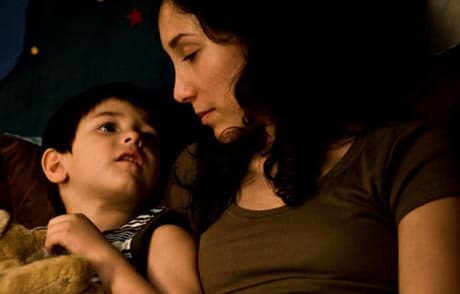Sibel Kekilli will always be remembered for her breakout performance in Fatih Akin's Head-On, which won several Golden Bear awards (Germany's Oscars), but also brought to light Kekilli's previously hidden past in pornography. While her role in Head-On might have lent itself to her tumultuous history, with its rough sex, drug and alcohol abuse, violent relationships and suicide attempts, her latest turn in When We Leave surely will solidify her immense talent as more than a mere one-trick pony.
Written and directed by Feo Aladag, When We Leave follows Umay (Kekilli) as she leaves her abusive husband in Turkey and flees to Germany with her young son to live with her family, only to be shunned by them, as Turkish traditions outweigh familial bonds. Umay is remarkable at fending for herself and her son, but cannot keep from begging her family to love her, no matter how cold or increasingly violent they become.
I found myself chiming in with a few you-go-girls several times throughout, as Umay increasingly garners one-ups over her scheming family, but her devotion to them causes the pacing of When We Leave to lose steam, even beginning to grate as the second act draws to a close. What'll keep bums in seats is Kekilli and Settar Tanriogen's (as Umay's father, Kader) performances, which are raw, crude and rarely sentimental, delivered with such volition that every facial or verbal nuance lands with a memorable belligerence. Kekilli is scrappy, yet guarded, blending a heartbreaking mix of hope and insecurity.
This is writer/director Feo Aladag's first feature film after working in television for years, and her script and directorial style enjoy un-pregnant pauses quite often for scenes that may just be masturbatory in execution, but this is a small note. When We Leave is a provocative and moving treatise on the sacrifices of marginalized Middle Eastern women living invisibly in the West.
(Mongrel Media)Written and directed by Feo Aladag, When We Leave follows Umay (Kekilli) as she leaves her abusive husband in Turkey and flees to Germany with her young son to live with her family, only to be shunned by them, as Turkish traditions outweigh familial bonds. Umay is remarkable at fending for herself and her son, but cannot keep from begging her family to love her, no matter how cold or increasingly violent they become.
I found myself chiming in with a few you-go-girls several times throughout, as Umay increasingly garners one-ups over her scheming family, but her devotion to them causes the pacing of When We Leave to lose steam, even beginning to grate as the second act draws to a close. What'll keep bums in seats is Kekilli and Settar Tanriogen's (as Umay's father, Kader) performances, which are raw, crude and rarely sentimental, delivered with such volition that every facial or verbal nuance lands with a memorable belligerence. Kekilli is scrappy, yet guarded, blending a heartbreaking mix of hope and insecurity.
This is writer/director Feo Aladag's first feature film after working in television for years, and her script and directorial style enjoy un-pregnant pauses quite often for scenes that may just be masturbatory in execution, but this is a small note. When We Leave is a provocative and moving treatise on the sacrifices of marginalized Middle Eastern women living invisibly in the West.
